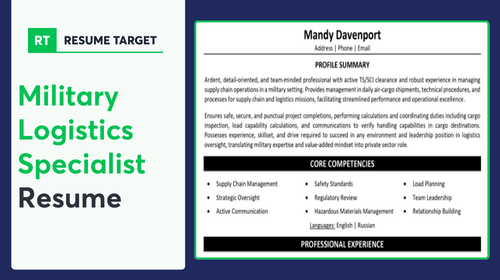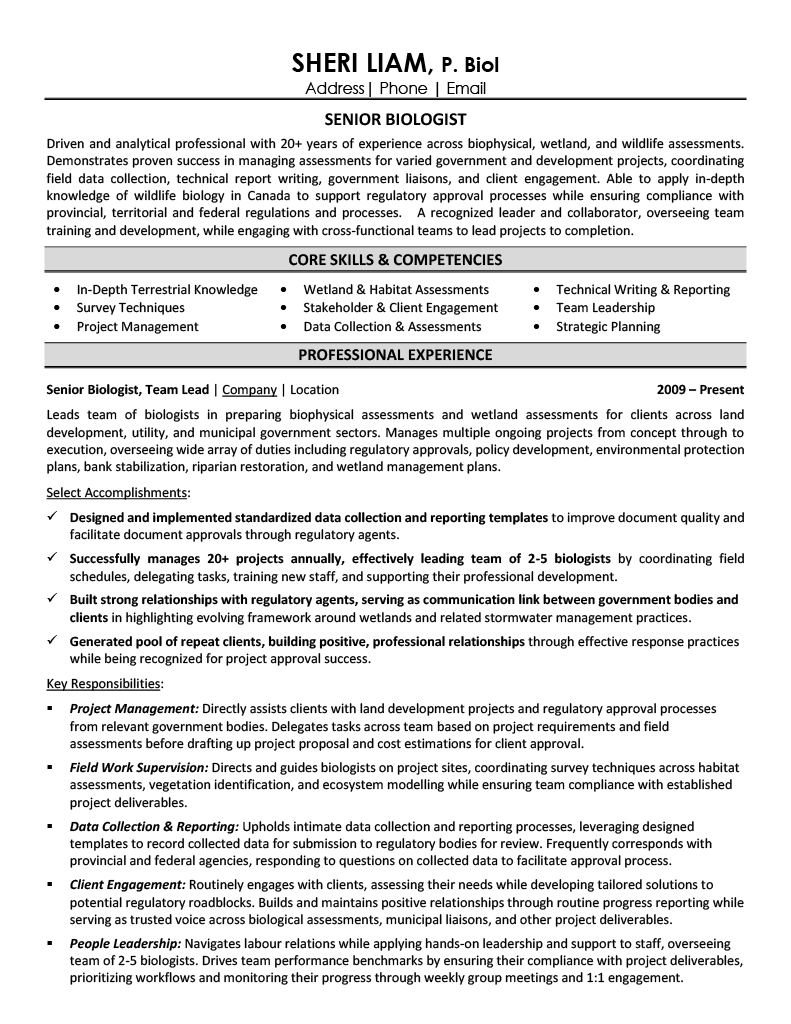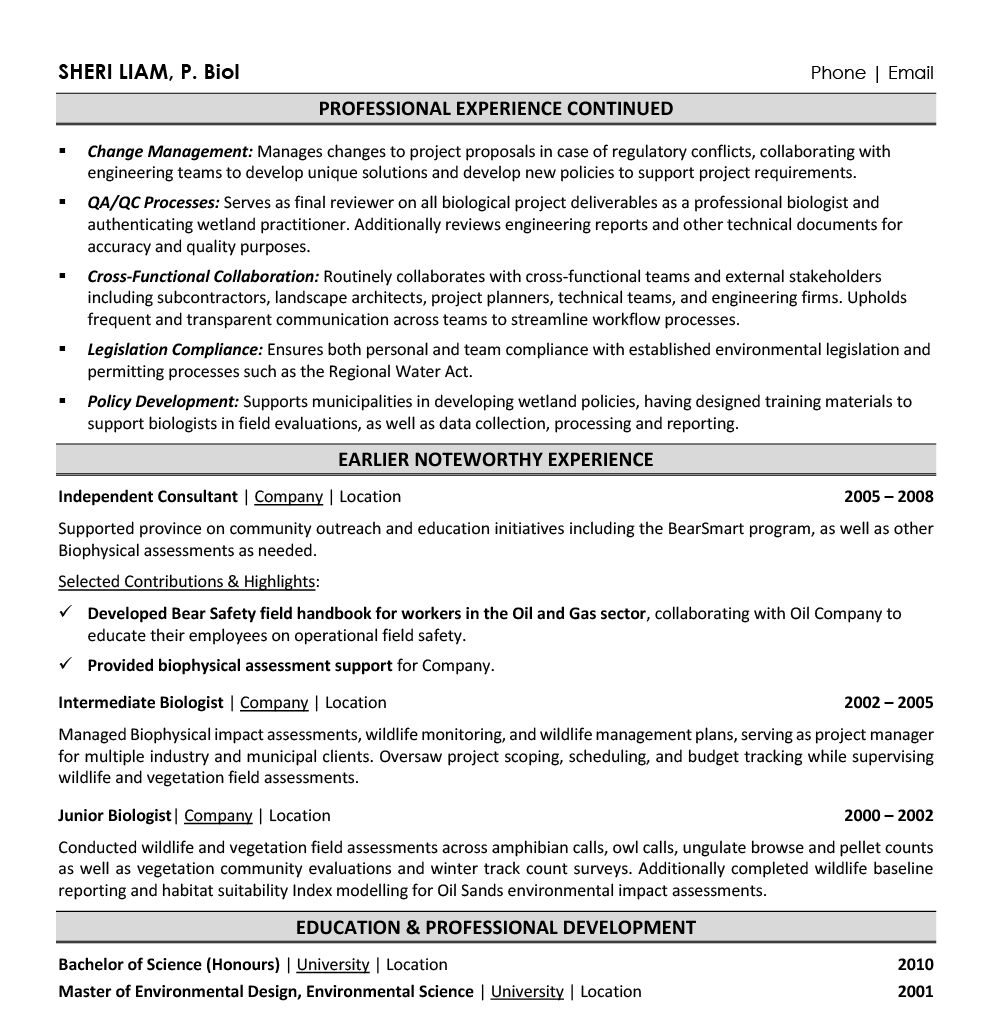

Turning scientific research and complex fieldwork into a strong resume can feel like decoding your own data. Many biologists struggle to translate their technical expertise and academic experience into language that resonates with hiring managers outside the lab.
Are you finding it difficult to showcase both your scientific knowledge and your hands-on experience? Your resume needs to bridge the gap between specialized research and real-world applications in healthcare, environmental science, biotechnology, and beyond.
Resume Target specializes in helping biologists communicate their value clearly and effectively. We'll help you craft a professional narrative that connects your skills in data analysis, lab techniques, and research design to the needs of employers in both academic and industry settings.


From unraveling the mysteries of microscopic cell behavior to tracking entire ecosystem dynamics, biologists serve as nature's dedicated investigators, with many specializing in fields like research, healthcare, and environmental management.
These scientific detectives spend their days conducting experiments, analyzing complex data, and documenting their findings about living organisms - whether they're studying disease patterns in a medical lab, tracking endangered species in the field, or developing new sustainable agriculture solutions.
If you're fascinated by the intricate workings of life itself, a career in biology offers numerous paths for growth and specialization, from cutting-edge biotechnology research to vital conservation work - let's explore how you can transform your curiosity about living systems into a rewarding professional journey.
Let's talk about what's exciting in the world of biology careers! Your earning potential as a Biologist can be quite rewarding, with opportunities to increase your compensation as you gain expertise and advance in your career. The field offers multiple paths for growth, and your salary can significantly improve as you develop specialized skills and experience.
Figures from: Salary.com
Starting as a Research Assistant, biologists can advance through specialized roles with education and experience. Your path may lead from lab work to managing research teams or heading departments.
Beyond basic laboratory techniques, advancing your career requires a blend of technical expertise and leadership capabilities.
- Laboratory Analysis and Research Design - Data Analysis and Statistical Methods - Scientific Writing and Documentation - Project Management - Communication and Presentation - Team Leadership - Problem-solving - Research Protocol DevelopmentLaunch your biology career through entry-level positions like research assistant, laboratory technician, or field researcher while building essential lab skills and scientific expertise.
To advance in your biology career, you'll need to develop key professional capabilities, including strong communication skills for engaging with both scientists and non-scientists in various research settings.
Note: I've kept the introduction under 200 characters while highlighting key entry points, and included a transition sentence that incorporates verified data from the provided research while maintaining a direct, professional tone.Requirements from NC State Extension
From California's biotech hubs to Maryland's federal labs, biologists find diverse opportunities across research and industry.
Figures from U.S. Bureau of Labor Statistics
Struggling to translate your complex lab work, research projects, and fieldwork into a compelling biologist resume that hiring managers will actually want to read? This comprehensive, section-by-section guide will show you exactly how to showcase your scientific expertise and achievements in a format that gets results.
As a biologist, you're comfortable analyzing complex data and conducting detailed research, but condensing your professional story into a few powerful lines can feel more challenging than mapping an entire genome.
While you excel at documenting intricate biological processes and publishing detailed findings, translating your expertise in fieldwork, lab techniques, and research methodology into a compelling summary requires a different skill set - one that helps hiring managers quickly recognize your unique value.
How would you describe your primary biological specialization and the broader scientific impact of your research or work focus in a single sentence?
Reason: Opening with your specific area of expertise immediately positions you within the vast field of biology and helps hiring managers understand your core value proposition. This frames the rest of your summary within your specialized context.
What combination of technical skills, research methodologies, and biological disciplines best represents your professional identity as a biologist?
Reason: This helps you articulate your unique blend of capabilities in a way that distinguishes you from other biologists and demonstrates your versatility within the field.
How does your background in biological sciences contribute to solving real-world challenges or advancing scientific understanding in your field?
Reason: This question helps you articulate your broader value to potential employers by connecting your expertise to practical applications or scientific advancement, making your summary more compelling and relevant.
As a biologist, you'll need to showcase both your technical laboratory expertise and your analytical capabilities, from PCR techniques to data analysis software proficiency.
Your resume should highlight both complex research skills like experimental design and routine but essential abilities like maintaining detailed laboratory records and following safety protocols.
Showcase your scientific expertise by organizing your experience into three impactful categories: a concise role overview highlighting your research focus, quantifiable achievements from your lab and field work, and core responsibilities that demonstrate your technical and analytical capabilities.
Many biologists struggle to translate complex research outcomes and technical laboratory procedures into compelling achievements that resonate with hiring managers. Transform your scientific contributions into powerful success stories by connecting your research innovations, methodologies, and discoveries to measurable impacts on scientific advancement, funding secured, and organizational efficiency.
The responsibilities section demonstrates how you apply scientific principles to solve real-world problems and advance research goals. Your duties should show both technical expertise and ability to communicate complex biological concepts while highlighting your contribution to research, conservation, or development projects.
Your biology credentials should highlight your highest academic degree first, followed by specialized certifications that demonstrate your expertise in specific research areas or laboratory techniques. As a biologist, make sure to include any relevant research licenses, biosafety certifications, or specialized training that sets you apart in your field of study.
Now that you've created a strong foundation using Resume Target's comprehensive resume writing guidelines, you're ready to transform your CV into a powerful tool for landing your ideal biology position.
While many candidates focus solely on customizing their cover letters, successful biologists know that personalizing their resume for each research facility, laboratory, or organization is equally crucial for standing out in this competitive field.
By strategically incorporating specific keywords and highlighting relevant research experience, techniques, and methodologies from each job posting, your customized resume will not only sail through ATS screening systems but will also demonstrate to hiring managers that you're precisely the biological expert they're seeking.
Ready to turn your biology resume into a specimen of perfection? Let's dive into making your qualifications impossible to ignore!
Don't let a lack of professional experience hold you back from launching your career as a Biologist!
Your academic background, laboratory skills, and research projects can create a compelling story that showcases your potential.
Focus on highlighting your scientific knowledge, technical laboratory proficiency, and research experience to create a standout resume.
For more detailed guidance, check out the Student Resume Writing Guide to ensure you're presenting your qualifications in the best possible light.
Your biology degree and research experience have equipped you with valuable scientific skills that employers are actively seeking in their next team member.
Transform your academic achievements, lab work, and research projects into a compelling narrative that showcases your readiness to contribute to real-world biological research and analysis.
"Detail-oriented and research-focused Biologist with foundational laboratory experience gained through undergraduate research and two summer internships in molecular biology. Proficient in PCR techniques, cell culture, and data analysis using statistical software. Contributed to published research on gene expression in marine organisms while maintaining 98% accuracy in lab protocols. Seeking to leverage strong analytical skills and research capabilities to advance biological research initiatives while pursuing opportunities for professional growth."
Now's your chance to showcase the rigorous academic foundation that prepared you for a career in biological sciences!
Transform your educational background into compelling content by highlighting specialized coursework like "Advanced Cell Biology" or "Ecological Field Methods," along with any research projects or lab work that demonstrate your hands-on scientific capabilities.
UnavailableRelevant Coursework: Cell Biology | Molecular Genetics | Microbiology | Organic Chemistry | Biochemistry | Environmental Science
Key Projects:
Microbial Growth Analysis Study: Investigated the effects of various environmental conditions on bacterial growth rates in laboratory settings to determine optimal growth parameters for industrial applications.
Ecosystem Biodiversity Assessment: Conducted a comprehensive field study of local wetland biodiversity to evaluate the impact of urban development on species distribution.
Leverage your academic training, laboratory experience, and research projects to showcase the technical and analytical capabilities you've developed through your biology coursework, internships, and hands-on fieldwork.
As an entry-level biologist, your combination of laboratory skills, research capabilities, and analytical thinking positions you well for roles in research institutions, pharmaceutical companies, or environmental agencies, where the demand for biological expertise continues to grow.
Let's face it - translating years of complex research, methodologies, and breakthrough findings into a clear, compelling resume can feel like trying to explain DNA replication to a five-year-old.
At Resume Target, we specialize in crafting resumes for scientific professionals that strike the perfect balance between technical expertise and accessible impact.
Our team has helped countless biologists transform dense laboratory achievements into powerful career narratives that resonate with both technical reviewers and HR professionals.
With groundbreaking research happening daily in the life sciences field, there's never been a better time to ensure your resume matches your expertise - let's connect today to craft a resume that puts your scientific career in focus.
Impress any hiring manager with our Scientist resume writing service. We work with all career levels and types of Scientist professionals.
Learn More → Scientist Resume Writing Services